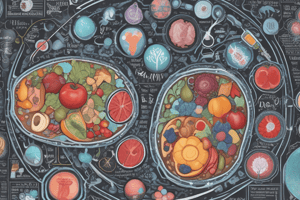Podcast
Questions and Answers
What is a key point about the applications of science?
What is a key point about the applications of science?
- They can be harmful if misused. (correct)
- They require no ethical considerations.
- They are free from limitations.
- They always lead to positive outcomes.
Which statement best reflects the nature of scientific knowledge?
Which statement best reflects the nature of scientific knowledge?
- It is limited to physical phenomena only.
- It is based solely on personal beliefs.
- It is subject to change based on new evidence. (correct)
- It is infallible and unchanging.
How can scientific knowledge help in managing natural resources?
How can scientific knowledge help in managing natural resources?
- By exploiting resources for profit
- By disregarding environmental impacts
- By limiting consumer access to resources
- By providing guidelines for sustainable practices (correct)
What can be a result of overusing plastic, according to the applications of science?
What can be a result of overusing plastic, according to the applications of science?
Which of the following is NOT a characteristic of scientific studies?
Which of the following is NOT a characteristic of scientific studies?
Which statement accurately reflects the nature of scientific knowledge?
Which statement accurately reflects the nature of scientific knowledge?
What limitation of scientific knowledge is highlighted ?
What limitation of scientific knowledge is highlighted ?
What does the content imply about the relationship between scientific evidence and certainty?
What does the content imply about the relationship between scientific evidence and certainty?
What role does evidence play in the evolution of scientific knowledge?
What role does evidence play in the evolution of scientific knowledge?
Why is scientific knowledge considered to have limitations?
Why is scientific knowledge considered to have limitations?
Which statement reflects a key aspect of scientific knowledge?
Which statement reflects a key aspect of scientific knowledge?
What distinguishes a scientific invention from a scientific discovery?
What distinguishes a scientific invention from a scientific discovery?
What does the evolution of scientific understanding about the Earth and Sun demonstrate?
What does the evolution of scientific understanding about the Earth and Sun demonstrate?
Which concept is represented by the increased evidence for understanding natural phenomena?
Which concept is represented by the increased evidence for understanding natural phenomena?
Which of the following statements accurately reflects the impact of smartphones on society?
Which of the following statements accurately reflects the impact of smartphones on society?
What is the primary method through which scientists gather evidence to test their ideas?
What is the primary method through which scientists gather evidence to test their ideas?
Which branch of science focuses on the study of living organisms?
Which branch of science focuses on the study of living organisms?
What example illustrates the application of scientific knowledge in daily life?
What example illustrates the application of scientific knowledge in daily life?
What is the role of scientific methodology in developing scientific knowledge?
What is the role of scientific methodology in developing scientific knowledge?
Which field studies the properties and reactions of substances?
Which field studies the properties and reactions of substances?
What can be said about the nature of science ?
What can be said about the nature of science ?
Flashcards
Science
Science
The study of phenomena and events in Nature. It involves questioning, observation, experimentation, and analysis to uncover natural laws.
What is science?
What is science?
The systematic study of the natural world, aiming to understand its phenomena and events through observation, experimentation, and analysis.
Branches of science
Branches of science
Different areas of science focus on specific aspects of the natural world. Examples include biology, physics, chemistry, astronomy, geology, and medicine.
Biology
Biology
Signup and view all the flashcards
Physics
Physics
Signup and view all the flashcards
Chemistry
Chemistry
Signup and view all the flashcards
Astronomy
Astronomy
Signup and view all the flashcards
Evidence-based science
Evidence-based science
Signup and view all the flashcards
Science is based on evidence
Science is based on evidence
Signup and view all the flashcards
Scientific knowledge can change
Scientific knowledge can change
Signup and view all the flashcards
What is a scientific invention?
What is a scientific invention?
Signup and view all the flashcards
Benefits of smartphones
Benefits of smartphones
Signup and view all the flashcards
Harmful effects of smartphone overuse
Harmful effects of smartphone overuse
Signup and view all the flashcards
Nature of Science
Nature of Science
Signup and view all the flashcards
Application of Science
Application of Science
Signup and view all the flashcards
Benefits of Science
Benefits of Science
Signup and view all the flashcards
Misuse of Science
Misuse of Science
Signup and view all the flashcards
Science & Technology
Science & Technology
Signup and view all the flashcards
Nuclear Technology
Nuclear Technology
Signup and view all the flashcards
Drug Use
Drug Use
Signup and view all the flashcards
Galileo's Experiment
Galileo's Experiment
Signup and view all the flashcards
Scientific Knowledge & Evidence
Scientific Knowledge & Evidence
Signup and view all the flashcards
Scientific Knowledge Changes
Scientific Knowledge Changes
Signup and view all the flashcards
Gastric Ulcers: Evidence Shift
Gastric Ulcers: Evidence Shift
Signup and view all the flashcards
Limitations of Science
Limitations of Science
Signup and view all the flashcards
Science & Understanding the World
Science & Understanding the World
Signup and view all the flashcards
Scientific Knowledge: Always True?
Scientific Knowledge: Always True?
Signup and view all the flashcards
Can Science Solve All Problems?
Can Science Solve All Problems?
Signup and view all the flashcards
Study Notes
Learning about Science
- Science is the study of phenomena and events in nature
- Scientists ask questions about nature and try to find answers
- Scientific knowledge is built through systematic studies, which involve observation, experimentation and analysis
- People are curious about things around them and ask questions when they don't understand something
- Examples of science-related questions: "Why is the sky blue?", "How does hail form?" and "What causes food spoilage?"
- Scientific knowledge is based on evidence. Scientists use experiments to test ideas and gain evidence.
- Scientific knowledge is subject to change. New evidence can lead to revised scientific ideas.
Nature of Science
- Scientists accept an idea only when supported by evidence.
- Experiments are one method used to collect evidence
- Aristotle believed heavier objects fall faster than lighter objects.
- Galileo's experiments, however, proved Aristotle's idea to be false.
- Science is based on evidence
Scientific Knowledge Limitations
- Scientific knowledge is limited. Not every question can be answered using scientific knowledge.
- Scientific knowledge is based on evidence, but it isn't always possible to answer every question using existing methods.
- Questions about personal values and ethics (e.g., is nuclear power good?), cannot be answered using scientific methods alone.
Application and Impact of Science
- Scientific discoveries and inventions improve our understanding of the natural world.
- Scientific discoveries and inventions improve the quality of life
- Developments in technology stem from scientific knowledge.
- Improvements in technology have led to discoveries, like the microscope, which allowed scientists to understand microorganisms; and led to the invention of new medicines.
Application and Impact of Science (Examples)
- Inventions such as light bulbs, smartphones, and vaccines are examples of technology derived from scientific knowledge
- Scientists developed ways to preserve foods through refrigeration
- Scientists discovered microorganisms as the cause for food spoilage, leading to developing ways to prevent food spoilage
- Modern life depends on scientific knowledge found in the natural world
Development of Technology
- Biotechnology: Used to develop food products like bread and cheese, and medical products such as vaccines
- Nanotechnology: Improved textiles by making them lightweight, waterproof, and stain-resistant
- Wireless communication technology: Faster communication is possible through the development of various technologies that use microwaves
- Robotic technology: Improved efficiency in manufacturing and other areas through the invention of robots
- Scientists have designed many useful products and inventions to improve quality of life
Applying Knowledge to Solve Daily Life Problems
- Science, technology, and mathematics skills are often used together to solve problems
- Techniques were applied to fight COVID-19, involving scientific understanding of the coronavirus, the development of technology like machines for rapid detection, and mathematical analysis of infection trends.
Two Sides of Science
- Scientific applications can bring great benefits, but misuse can also cause problems
- Plastic is an example where the positive benefit is offset by overuse that causes waste.
- Technology such as nuclear power, while beneficial when used appropriately, can also result in catastrophic incidents if not managed correctly.
- Development of drugs are highly beneficial, but their misuse can have a significant adverse effect on health and safety
Studying That Suits You
Use AI to generate personalized quizzes and flashcards to suit your learning preferences.




